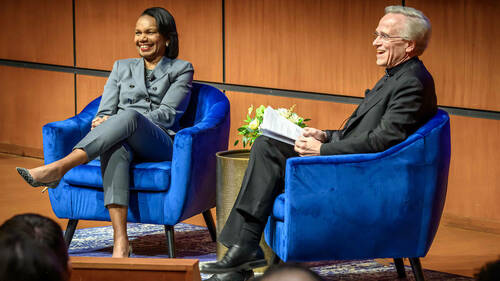
Speaking on a broad array of topics — from the Russian invasion of Ukraine to political polarization, the United States’ founding fathers, her professional mentors, women as leaders, the state of college athletics, her time on campus and more — the Tad and Dianne Taube Director of Stanford’s Hoover Institution, the Thomas and Barbara Stephenson Senior Fellow on Public Policy, 66th U.S. secretary of state and Notre Dame alumna Condoleezza Rice captivated an overflow crowd at the University of Notre Dame on Thursday (April 28) during an hour-long conversation moderated by University President Rev. John I. Jenkins, C.S.C.
Members of the campus and broader South Bend area communities began lining up for a seat in the Jordan Auditorium more than an hour in advance of the engagement. After a long and rousing welcome from the full house of 350 attendees, Father Jenkins welcomed Rice with a smile, saying, “I think we can say we’re glad to have you back at Notre Dame.”
When asked about her level of surprise about the invasion, she said: “I knew he had this aspiration for the restoration of the Russian empire. This (the war) is not really about Russian security interests, not about NATO expansion, it really is this nostalgia for empire. It’s hard for us to understand. The part that is surprising to me is I knew he had the aspiration … but what turned that aspiration into an operational plan, that’s what we really have to ask.”
Rice described what she believes are three important components to Putin’s perspective on the war and the overall response of Russia’s invasion. “First, I think he (Putin) certainly miscalculated who the Ukrainians are. He has said that Ukraine is not a real country; he believed that somehow the Russians would be seen as liberators. He didn’t know they (Ukrainians) see themselves as a separate people, that they resent the ‘Little Russia’ moniker. Secondly, serious miscalculation about what the West — broadly defined, democratic states like Japan and others — would do. He believed the propaganda that the West was done (with war). And third, most importantly, he actually thought his military was good and they are not. But to be clear, what the Russian military lacks in competence, it makes up for in brutality.”
An expert on Soviet/Russian and Eastern European affairs, Rice offered insights on Russian President Vladimir Putin and his influences, aspirations and strategies related to the war in Ukraine.
When asked how she would advise the U.S. administration on the war, she agreed with President Joe Biden that the future of Ukraine’s response to the war has to be Ukraine’s decision. “And right now, I don’t see any appetite among the Ukrainians for a settlement. They are in no mood to negotiate,” she said.
Rice offered comments on the spread of Russian attacks to NATO and non-NATO countries.
“I’m worried about the spread (of Russian attacks) … but I don’t think Putin wants a fight with NATO or any part of a conflict with the United States,” she said. “He has united NATO in a way that was unimaginable a year ago. A friend of mine said, ‘He has managed to end Swiss neutrality and German pacifism in a matter of a month.’”
When asked about the grim possibility of seeing the use of chemical or nuclear weapons, she said, “I’m not that worried about escalation to nuclear weapons. I don’t think we should be deterred by this kind of nuclear talk.”
The conversation shifted gears to other topics, including what led Rice to Notre Dame and memories of her time on campus. She cited stories about her long and special relationship with the late University President Rev. Theodore M. Hesburgh, C.S.C., and other mentors in her life and professional career.
Rice, who made several remarks about her love of sports, and football in particular, during the conversation, also commented on the state of college athletics.
As the chair of the Commission on College Basketball in 2017-18, she was joined by Father Jenkins and a dozen others who examined all aspects of Division I men’s basketball in the wake of FBI investigations into the sport.
She noted how the commission warned NCAA administrators then about what they saw on the horizon over what would become known as the name, image and likeness (NIL) policy, which allows college athletes to monetize their notoriety, and that they suggested putting “guardrails in place” around such policies.
“NIL now is the wild west,” Rice said. “I think there are all kinds of abuses taking place, but they are not abuses because there are no rules (governing NIL). I think we have to get back to the first principles of academic and athletic experiences.”
Father Jenkins offered Rice questions submitted by audience members and those watching the event livestream.
He concluded the program by saying, “Condi, you have embodied the values we espouse at Notre Dame — service to the common good, scholarly excellence, a magnanimity that allows you to embrace different viewpoints to find what’s best among us all. We couldn’t be more proud to say that you’re an alumna of Notre Dame, and we thank you for taking time out of your busy schedule to come and talk to us. God bless you.”
The two exited the stage to a long and spirited standing ovation from the audience.